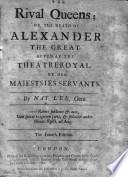Act i., Sc. 3.
The Rival Queens, or the Death of Alexander the Great (1677)
Works

The Rival Queens
Nathaniel LeeFamous Nathaniel Lee Quotes
“They called me mad, and I called them mad, and damn them, they outvoted me.”
Remark after being incarcerated in Bedlam for five years, as quoted in the Introduction of A Social History of Madness : The World Through the Eyes of the Insane (1987) by Roy Porter; also in "The Madness of King Jesus : Why was Jesus Put to Death, but his Followers were not?" by Justin J. Meggitt in Journal for the Study of the New Testament, Vol. 29, No. 4 (June 2007) http://jnt.sagepub.com/content/29/4/379.abstract.
“Man, false man, smiling, destructive man!”
Theodosius, or the Force of Love (acted 1680), Act iii., Sc. 2.
“Then he will talk—good gods! how he will talk!”
Act i., Sc. 3. "It would talk,— Lord! how it talked!", Beaumont and Fletcher, Scornful Lady (c. 1613; printed 1616), Act v., Sc. 1.
The Rival Queens, or the Death of Alexander the Great (1677)
“T is beauty calls, and glory shows the way.”
Act iv., Sc. 2. In stage editions, it is "Leads the way" with various interpolations, among them—
See the conquering hero comes!
Sound the trumpet, beat the drums!—
which was first used by Handel in "Joshua," and afterwards transferred to "Judas Maccabæus." The text of both oratorios was written by Dr. Thomas Morell, a clergyman.
The Rival Queens, or the Death of Alexander the Great (1677)
“When Greeks joined Greeks, then was the tug of war.”
Act iv., Sc. 2.
The Rival Queens, or the Death of Alexander the Great (1677)
